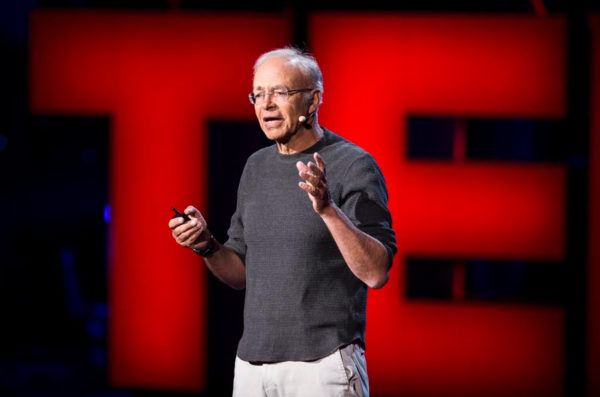(For videos of the entire workshop, click here)
By Poh De Sheng
World-renowned professor of bioethics and philosopher Peter Singer was speaking over Skype at our workshop, Introduction to Effective Altruism, co-organised by Effective Altruism Singapore and Humanist Society (Singapore) at Jurong Regional Library on May 15, 2016. The topic of discussion was effective altruism, an international movement in response to inefficiencies in charity, especially due to emotional decision making. Dr Singer is part of the movement himself.
During the skype (full video above), workshop participants were given a rare opportunity to chat with Singer. Here are six lessons we took away from the philosopher that evening.
#1 Capitalism causes inequality, but inequality itself is NOT a problem
One participant asked Singer about the “philosophical conundrum” of choosing between pursuing a profitable career to increase donations to charities, and rejecting a capitalist system that is causing a lot of inequality to the world. Singer said that while capitalism perpetuates inequality, inequality itself is not a problem. If overall productivity can be increased, the richest and poorest will still benefit in absolute terms. Instead of worrying whether we are increasing inequality, it is more important to focus on helping people at the bottom, he added. Evidence is also mixed with regards to whether capitalism is effectively helping people at the bottom. Singer pointed to China as a positive example where poverty has been reduced through capitalistic ventures such as a trade and export.
Photo: The famed skyline of Shanghai, the financial centre of China.
#2 Organisations distributing donations on behalf of individuals CAN be trusted
Willing donors are sometimes unaware of where to give, and how much to give. This is due to the lack of information and quantitative data provided by charities. These points were brought up to Singer by a participant. In response, Singer said that assessing the effectiveness of charities, which do the deciphering on donor’s behalf, does not have to be an individual endeavour. While we should not take these charities for granted, very often the work of these organizations can be trusted.
#3 It’s more expensive to help the poor in affluent countries, compared to developing countries.
One participant said that in Singapore, there is a perception that the government should be the one responsible for the poorest who have fallen through the cracks. The participant wondered how the average citizen can be mobilised to become more altruistic.
In response, Singer said it is much more expensive to help the poor in affluent countries, compared to helping their counterparts in developing countries. This is because the former is very often saddled with many other problems such as mental illness and various addictions and this makes helping the poor in affluent nations a more complicated endeavour. Singer added that while individual contributions are the most effective when directed to developing countries, individuals in affluent countries such as Singapore should still lobby the government to help those who have fallen through the cracks domestically.
Photo: A homeless person in the United States. Source: Mary Scully Reports
#4 In many third world countries, charities have a BETTER track record than the local governments.
One participant wondered if it would be more effective to invest in institutional solutions enacted by governments and corporations, which are more stable in the longer term. For example, instead of donating to charities that constantly have to channel external funds to healthcare for poor African kids, why not develop a universal healthcare system for them?
Singer is not optimistic with this approach as he felt that third world countries have not shown much interest in protecting human rights and reaching out to the poor. Although there are some third world governments that try very hard to tackle poverty, there are other governments that seem to exist for the purpose of enriching the ruling elite. Singer said is possible for individuals to influence governments and corporations through involvement in civil society. One example is the successful lobbying efforts of environmental groups to stop pollution. However, this approach is still a gamble compared to giving directly to organisations dedicated to improving the welfare of individuals. These organisations, despite the lower payoffs, have a proven track record and thus, donors have more confidence in them.
Photo below: Peter Singer giving a TED talk in 2013. Source: James Duncan Davidson and TED.
#5 In consumerist cultures, people who are generous and unselfish tend to HIDE those characteristics in order to not to appear odd.
One participant lamented that people not actively engaged in altruism do not feel the loss of misdirected resources. The participant wondered how such people can be persuaded to a more ethical way of living. Singer pointed to sociological research showing to in consumerist cultures, even people who are generous and unselfish will tend to hide those characteristics in order to not appear odd.
Singer believes that this is changing and the effective altruism movement is growing faster today, compared to the past. He hopes the movement can eventually hit a critical mass of people who think differently. “I don’t know where that point is, and don’t think that we’ve reached that point yet. However, the fact that we are growing is an indicator that we will reach that point eventually,” he said.
#6 Donating to developing countries is generally much more effective than giving to developed countries, although exceptions exist.
One of the final questions to Singer was about why organisations that evaluate effective charities seem to focus exclusively on the developing world, given that charities in developed nations could use their donations more effectively too.
Singer said that GiveWell, the first really rigorous charity evaluator, looked at charities both in developing countries and the US itself. The evaluator found that generally speaking, giving to charities in developing countries are many times more effective than those in developed countries. However, his Princeton university colleague Angus Deaton has suggested that exceptions to this rule exist. For example, it can happen when charities in developed countries leverage on their technological superiority to develop cost effective cures for diseases in developing countries.








